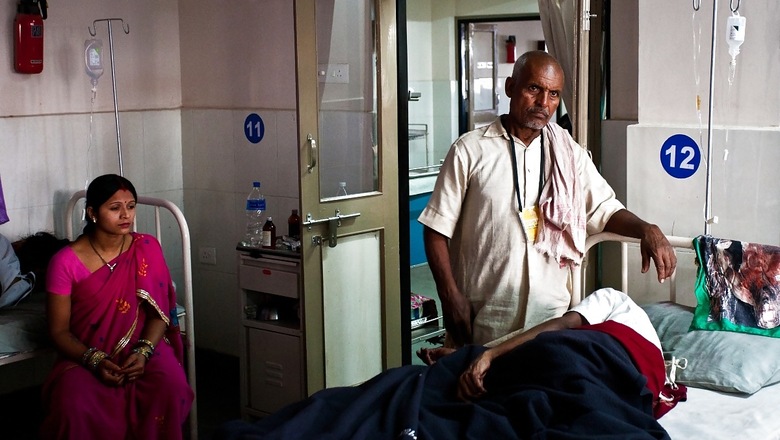
views
Private healthcare in India is a crime scene. Blood and tears of millions of families flow freely here. Fortunes are made. But there is hardly anyone to whom one can report the crime.
Laws regarding modern private healthcare are absent or vague. Way to the courts is expensive and tedious. From overcharging to incompetence to neglect to downright cruelty goes on brazenly, because patients’ families are helpless and psychologically already on the backfoot.
The media strokes the prize pony and whips the overburdened mule. It solely and relentlessly goes after the government hospitals which are carrying the load of the unwashed millions, often doing a stellar job of it. But it seldom investigates the private hospitals which give advertisements, extend favours, and have aggressive PR departments to cover up their crimes.
India needs a Real Estate Regulation Act (RERA)-like legislation and redressal framework to safeguard interests — lives or lifelong savings — of families struck by illness.
Here are some areas of concern that ought to be addressed by such a law.
Accountability, punishment for owners
While individual medico-legal cases against doctors are not uncommon, rarely the owners or promoters of private hospitals are pulled up or punished. In one of the rarest cases, the Supreme Court in 2013 had asked Kolkata-based AMRI Hospital and three doctors to pay Rs 5.96 crore along with interest to a US-based Indian-origin doctor who lost his 29-year-old child psychologist wife during their visit to India in 1998.
Private hospital owners remain in the shadows and pocket profits. Insiders say that they pressure doctors and the hospital staff by setting ‘revenue targets’, illegally juice out patients’ insurance money, and extort families beyond their paying power.
A law that holds such owners accountable and harshly punishable is exigent. When the top management is held directly responsible, it will ensure discipline and integrity among the staff.
Transparency and redressal on billing
An irrational number of medicines, tests, and non-medical equipment are added to inflate bills. Sometimes the volume of little things like sanitiser, gloves, or syringes makes one wonder if they were used for one patient or the whole hospital.
Patients who don’t need intensive care are automatically admitted and kept in ICU to jack up the fees. Fees are listed for specialists who had not even met or treated the patient.
And yet one is obligated to pay.
Every state must have a body which can address billing-related queries.
Cost cap on medicines and machinery
A Bipap machine which costs Rs 5,000 for hire for a month comes at Rs 2,500 a day in a private hospital ICU. Beds are charged double for patients with insurance. Such milking of insurance policies makes insurance companies charge dramatically high premiums. It becomes a vicious cycle.
Most importantly, most private hospitals do not allow families to buy generic medicines and control medical costs.
A new law needs to cap prices of beds, meds, and equipment.
CCTV footage in cases of dispute
Patients often complain of mental and even physical abuse by hospital staff. There have been reports of theft or mistreatment. In UP’s Aligarh, a patient was reportedly beaten to death by private hospital staff in 2020 for not paying Rs 4,000 ‘entry fee’.
Hospitals should be made to produce CCTV footage in case of such complaints.
Feedback-based ranking system
There ought to be a ranking system of hospitals based on the number of complaints, proven crimes as well as praise from patients and their families.
A transparent feedback system, not anonymous but linked to genuine identities of patients and their families, will encourage competition to stay ahead in service.
Mental health-holistic approach
Patients, especially the elderly, often face what is known as ‘ICU psychosis’. Because of high-intensity drugs, long periods of being restricted to the bed, and the constant, jarring beeping of the machines, their reality gets distorted. They lose the sense of space and time, imagine themselves in morbid or fearsome situations, and undergo severe pain and trauma.
Depression is also extremely common among the ill.
Every hospital must be mandated to take a holistic mental health approach using psychologists, psychiatrists and yoga coaches.
Doctors to declare favours from pharma
One of the worst banes of private healthcare is the nexus between Big Pharma and doctors. A PIL in Supreme Court states that pharma companies bribe doctors to the tune of more than Rs 4,000 crore a year to get their drugs over-prescribed, which damages public health.
Under the new law, every doctor and hospital management should have to declare favours they have taken from pharma and other companies.
Allow patients to get generic medicine
A number of families will be spared from being fined by the cost of treatment if every private hospital were to allow them to get generic medicine at low cost.
Under PM Narendra Modi, generic medicines have got a huge push under the PM Jan Aushadhi Yojna. A 10s strip of 10mg cetirizine tablets costs Rs 37.50 on average among known brands. The same drug under the Jan Aushadhi scheme costs Rs 2.75!
The use of generic medicine, if institutionalised, will break the stranglehold of private players and doctors on citizens’ medical spends.
Information, information, information
Although certain aspects of private healthcare come under RTI, the extent of it is debatable. RTI is usually done for big info. But hospitals and doctors often deny families basic day-to-day information on their patients. A new framework must ensure the free flow of information daily as a right of patients and their families.
Easier and timely discharge
One of the most disputed areas in private healthcare comes at the end: the discharge. Hospitals inflate bills last moment, keep patients waiting for hours, hold even the dead hostage overpayments. Often, patients who are dead for all practical purposes are forcefully kept on the ventilator just to make the family pay more.
This last mile must be smoothened by legislation to see that either party — the hospital or the affected family — does not get shortchanged, blackmailed, or bullied.
As the late columnist Bill Vaughan once famously said: “It is the duty of a doctor to prolong life and it is not his duty to prolong the act of dying.”
Abhijit Majumder is a senior journalist. Views expressed are personal.
Read all the Latest Opinions here



















Comments
0 comment